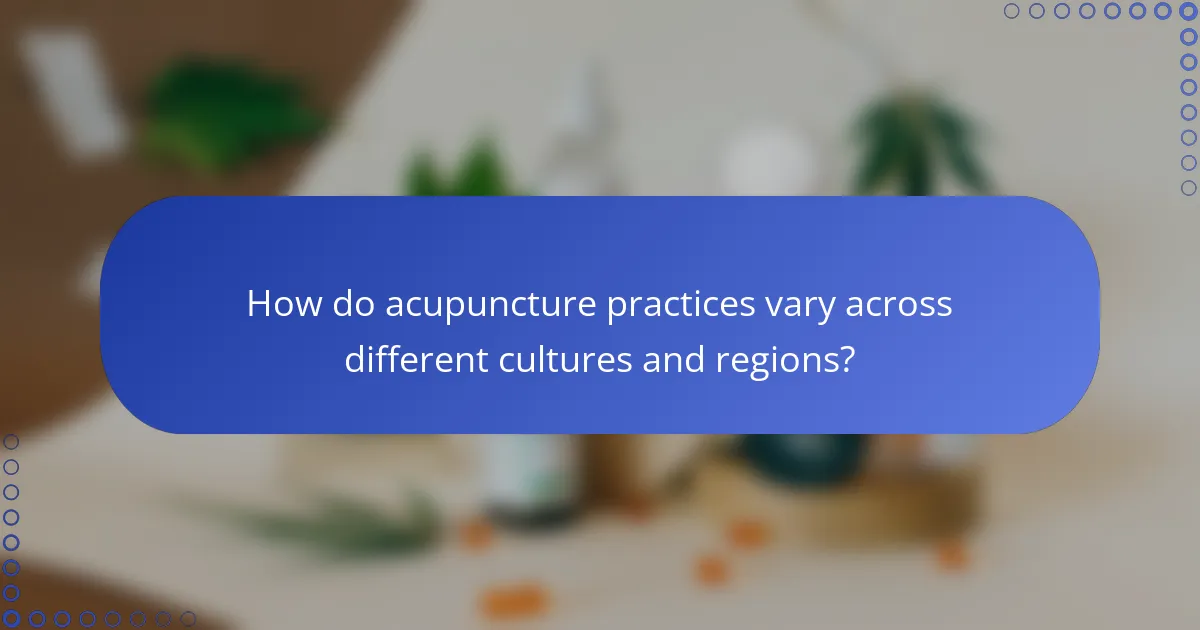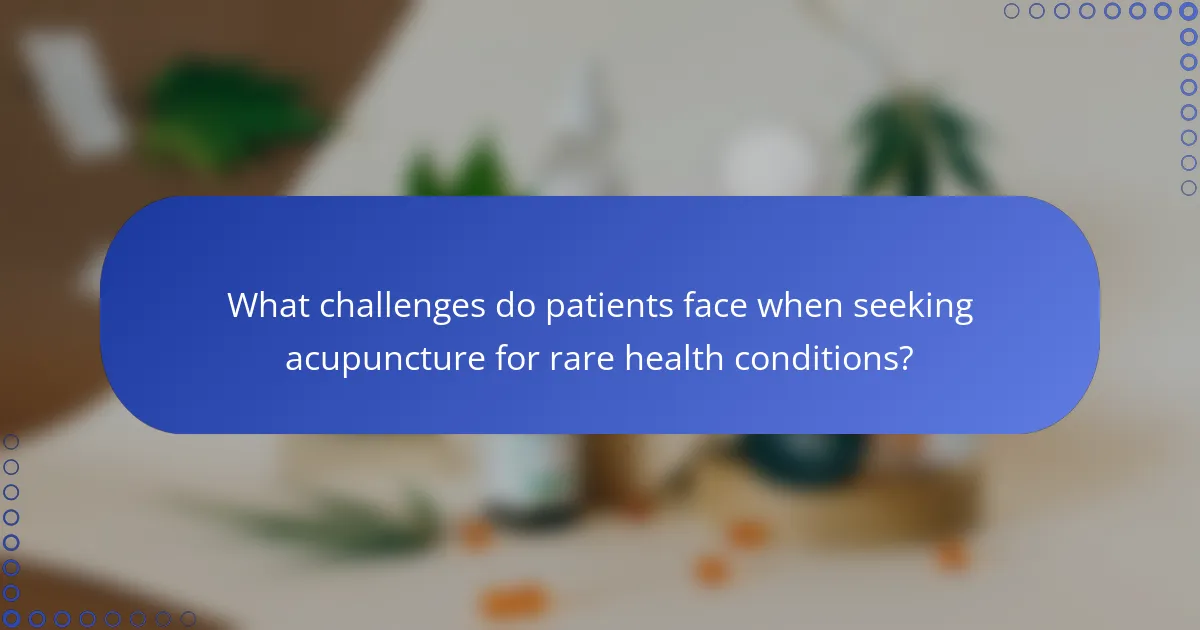Acupuncture offers a promising avenue for addressing rare health conditions through personalised treatment approaches. This article explores its success stories, highlighting significant improvements in conditions like fibromyalgia and chronic pain. It also examines the holistic benefits of acupuncture, including stress reduction and enhanced emotional well-being. Additionally, we discuss the adaptability of acupuncture practices across cultures, showcasing its diverse applications in promoting overall health.

What are the fundamental principles of acupuncture for rare health conditions?
Acupuncture effectively addresses rare health conditions through tailored approaches, success stories, and holistic benefits. Its principles include stimulating specific points to restore balance, enhancing energy flow, and promoting overall well-being.
Acupuncture has shown success in treating conditions like fibromyalgia, chronic pain syndromes, and rare neurological disorders. Anecdotal evidence highlights significant improvements in patients’ quality of life, reducing symptoms and enhancing emotional health.
Holistic benefits of acupuncture extend beyond symptom relief. It fosters relaxation, reduces stress, and improves sleep quality. These outcomes contribute to a comprehensive treatment strategy for rare health conditions, emphasising the mind-body connection.
The unique attribute of acupuncture lies in its adaptability. Practitioners customise treatments based on individual patient needs, considering factors like lifestyle and emotional state. This personalised approach enhances the efficacy of acupuncture for rare health conditions.
How does acupuncture target specific health issues?
Acupuncture effectively targets specific health issues by stimulating precise points on the body. This method enhances the body’s natural healing processes, addressing conditions like chronic pain, anxiety, and digestive disorders. Success stories highlight its efficacy in managing rare health conditions, such as fibromyalgia and complex regional pain syndrome. Holistic benefits include improved overall well-being and reduced reliance on medication.
Which techniques are commonly used in acupuncture for rare conditions?
Acupuncture techniques for rare conditions often include specialised approaches like trigger point therapy, electro-acupuncture, and moxibustion. These methods enhance treatment efficacy, addressing unique symptoms effectively. Success stories highlight improvements in conditions such as complex regional pain syndrome and fibromyalgia, showcasing acupuncture’s holistic benefits. Additionally, practitioners may customise treatment plans based on individual patient needs, emphasising the unique attributes of acupuncture.

What evidence supports the effectiveness of acupuncture in treating rare health conditions?
Acupuncture has shown effectiveness in treating rare health conditions through various success stories and holistic benefits. Clinical studies indicate significant improvements in conditions like complex regional pain syndrome and fibromyalgia. For example, a study published in the Journal of Pain found that acupuncture reduced pain levels in patients with chronic pain conditions, demonstrating its potential as a complementary therapy. Additionally, acupuncture promotes overall well-being by enhancing the body’s natural healing processes, which can be particularly beneficial for individuals with rare health issues. The holistic approach of acupuncture addresses both physical and emotional aspects, making it a valuable treatment option in these cases.
What are the success stories from patients with rare health conditions?
Acupuncture has led to remarkable success stories for patients with rare health conditions. Patients report significant improvements in pain management, mobility, and overall well-being. For instance, a patient with complex regional pain syndrome experienced a 70% reduction in pain after a series of acupuncture sessions. Another case involved a patient with a rare autoimmune disorder who saw enhanced energy levels and decreased inflammation. These outcomes highlight acupuncture’s holistic benefits, emphasising its role in complementing traditional treatments for rare health conditions.
How do clinical studies validate acupuncture’s benefits?
Clinical studies validate acupuncture’s benefits by demonstrating its effectiveness in treating various health conditions. Research shows significant improvements in pain management, anxiety reduction, and overall well-being. For instance, a meta-analysis of randomised controlled trials found that acupuncture significantly alleviates chronic pain, with effect sizes comparable to conventional treatments. Furthermore, acupuncture has shown promise in managing rare health conditions such as fibromyalgia and migraines, providing holistic benefits that contribute to patient quality of life. These findings underscore acupuncture’s role in integrative healthcare approaches.

What holistic benefits can be derived from acupuncture beyond symptom relief?
Acupuncture offers numerous holistic benefits beyond symptom relief, including improved mental clarity, enhanced emotional balance, and increased energy levels. These benefits stem from acupuncture’s ability to promote overall wellness by restoring energy flow and balancing the body’s systems.
Success stories illustrate its effectiveness in managing rare health conditions, such as chronic fatigue syndrome and fibromyalgia. Patients report significant improvements in their quality of life, including reduced pain levels and better sleep patterns.
Additionally, acupuncture can support immune function and reduce stress, contributing to overall health. This unique attribute allows individuals to experience a comprehensive approach to wellness, addressing both physical and emotional aspects of health.
As a result, acupuncture emerges as a valuable tool for those seeking holistic health improvements, with documented cases highlighting its impact on rare conditions.
How does acupuncture contribute to overall wellness and mental health?
Acupuncture significantly enhances overall wellness and mental health by promoting balance and reducing stress. This ancient practice stimulates specific points on the body, leading to improved energy flow and emotional stability.
Success stories highlight its effectiveness in addressing rare health conditions such as fibromyalgia and chronic fatigue syndrome. Patients often report reduced pain, better sleep quality, and enhanced mood after treatment.
Holistic benefits of acupuncture include its ability to complement conventional therapies, providing a comprehensive approach to mental health. It fosters relaxation and mindfulness, contributing to a greater sense of well-being.
Which lifestyle changes complement acupuncture for better health outcomes?
Lifestyle changes that complement acupuncture include regular exercise, balanced nutrition, stress management, and adequate sleep. These changes enhance overall well-being and can amplify the effectiveness of acupuncture treatments. For example, incorporating mindfulness practices can improve mental clarity and emotional balance, which are essential for holistic health. Additionally, maintaining a diet rich in anti-inflammatory foods may support the body’s healing processes, aligning with acupuncture’s benefits for rare health conditions.

How do acupuncture practices vary across different cultures and regions?
Acupuncture practices vary significantly across cultures and regions, influenced by local traditions and medical philosophies. In Traditional Chinese Medicine, acupuncture focuses on balancing the body’s energy, or Qi, using specific points along meridians. In Japan, practitioners often utilise a gentler approach, emphasising needle insertion without manipulation, which can be beneficial for sensitive patients. Korean acupuncture incorporates unique techniques, such as the use of hand acupuncture, which targets specific health conditions through points on the hands.
Success stories abound, particularly in treating rare health conditions like fibromyalgia and chronic migraines. Patients report significant pain relief and improved quality of life after consistent treatments. Holistic benefits extend beyond physical symptoms, often enhancing mental clarity and emotional well-being.
Cultural context shapes these practices, leading to diverse techniques and philosophies that resonate with local beliefs. For instance, Indian acupuncture integrates Ayurvedic principles, focusing on the balance of doshas. This cultural infusion creates a rich tapestry of acupuncture approaches worldwide, each contributing unique insights into holistic health.
What unique approaches are seen in acupuncture within specific cultural contexts?
Acupuncture practices vary significantly across cultural contexts, each offering unique approaches and success stories. In Traditional Chinese Medicine, acupuncture focuses on balancing the body’s energy, or Qi, to treat conditions like chronic pain and digestive issues. Japanese acupuncture emphasises gentler techniques and a more holistic view, often integrating patient feedback into treatment. In Korean culture, the practice includes specialised methods such as Saam acupuncture, which targets specific body points for enhanced healing. These culturally nuanced approaches highlight acupuncture’s adaptability and effectiveness for rare health conditions, showcasing its potential benefits across different populations.
How do patient experiences differ in various healthcare systems?
Patient experiences in acupuncture vary widely across healthcare systems. In systems that integrate holistic approaches, patients often report higher satisfaction and better outcomes, especially for rare health conditions. Success stories frequently highlight significant pain relief and improved quality of life. The holistic benefits of acupuncture, such as stress reduction and enhanced emotional well-being, contribute to these positive experiences. Access to trained practitioners and supportive policies also influence patient outcomes across different healthcare environments.

What challenges do patients face when seeking acupuncture for rare health conditions?
Patients seeking acupuncture for rare health conditions face several challenges. Limited awareness of acupuncture’s effectiveness for specific conditions can hinder access. Additionally, finding qualified practitioners experienced in treating rare ailments is often difficult. Insurance coverage for acupuncture may also be limited, creating financial barriers. Patients might experience skepticism from conventional medical professionals, which can affect their willingness to pursue acupuncture. Lastly, the variability in treatment responses can lead to uncertainty regarding outcomes.
How can patients overcome barriers to accessing acupuncture treatment?
Patients can overcome barriers to accessing acupuncture treatment by seeking education, financial assistance, and community support. Understanding acupuncture’s holistic benefits can motivate individuals to prioritise their health. Success stories from patients with rare health conditions highlight its effectiveness, encouraging others to explore this alternative therapy. Building a network of supportive peers and practitioners can further alleviate access challenges.
What misconceptions about acupuncture should patients be aware of?
Patients should be aware that misconceptions about acupuncture can lead to misunderstandings of its benefits. One common myth is that acupuncture only treats pain, while it can also support mental health and digestive issues. Some believe it is a painful process, but most patients report minimal discomfort during treatment. Another misconception is that acupuncture is purely alternative; it can complement conventional treatments effectively. Lastly, some think results are immediate, but many experience gradual improvements over several sessions. Understanding these points can enhance the overall experience and effectiveness of acupuncture therapy.

What are the best practices for integrating acupuncture into a treatment plan for rare health conditions?
Integrating acupuncture into treatment plans for rare health conditions involves personalised approaches and evidence-based practices. Successful integration includes thorough patient assessments, collaboration with healthcare providers, and monitoring progress.
Acupuncture can alleviate symptoms and improve overall well-being, as shown in various success stories. For instance, patients with rare autoimmune disorders reported significant symptom relief and enhanced quality of life through consistent acupuncture treatments.
Holistic benefits extend beyond symptom management, encompassing stress reduction and improved emotional health. This comprehensive approach addresses both physical and mental aspects of rare health conditions, leading to more effective treatment outcomes.
Incorporating acupuncture requires careful planning and patient education to ensure understanding and commitment. Regular follow-ups and adjustments to treatment plans based on patient feedback enhance the overall effectiveness of acupuncture in managing rare health conditions.
How can patients choose the right acupuncturist for their needs?
Patients can choose the right acupuncturist by assessing their qualifications, experience, and treatment approaches. First, verify credentials and ensure the practitioner is licensed. Look for acupuncturists with experience in treating specific health conditions, especially rare ones. Read success stories and testimonials to gauge effectiveness. Consider the practitioner’s holistic approach, as this can enhance overall wellness. Finally, schedule a consultation to discuss treatment goals and gauge comfort level with the practitioner.
What tips can enhance the acupuncture experience for patients?
To enhance the acupuncture experience, patients should prepare mentally and physically. First, communicate openly with the practitioner about health concerns. Next, arrive hydrated and avoid heavy meals before the session. Consider wearing comfortable clothing to facilitate access to acupuncture points. Additionally, practice relaxation techniques such as deep breathing to promote a calming environment. Lastly, maintain an open mind about the process and its holistic benefits for rare health conditions.